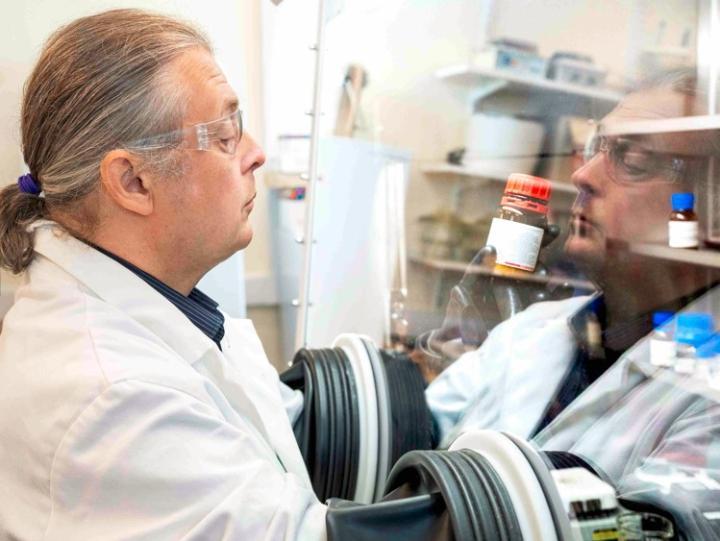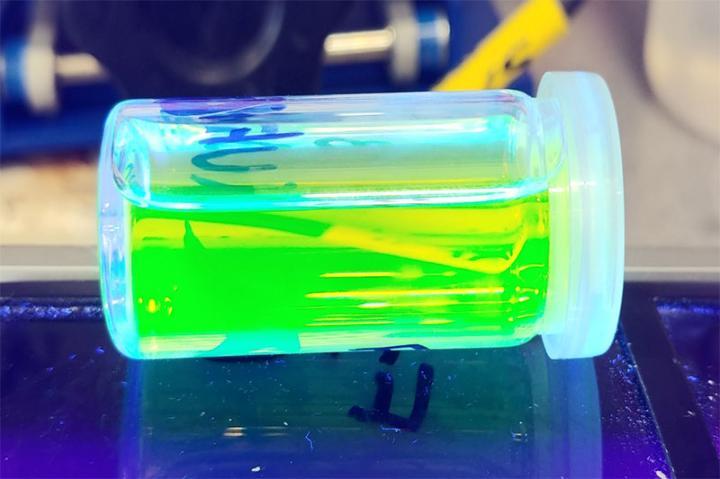Academic Profile: Dr Stephen Hickey
Harnessing the versatility of nanoparticles
Dr Stephen Hickey is a Reader in the School of Chemistry and Biosciences, interested in the use of nanoparticles to create versatile materials for sustainable and clean energy generation. His interest in Chemistry began with an undergraduate degree at Bath University, which followed five years traveling around Europe and a stint in industry. Here he talks more about his career journey and his current projects...
How did your interest in nanoparticles develop?
I followed my degree at Bath with a master's at Bristol University at the internationally renowned Bristol Colloid Centre, and remained there to undertake my PhD working with Prof Jason Riley, attaching semiconductor nanoparticles onto conductive glass surfaces for solar cell applications. We published a number of papers, which caught the attention of Prof Daniël Vanmaekelbergh at Utrecht University – who was looking for researchers who had very specific experience with nanoparticles as they were very new materials at the time. He invited me for an interview which led to my first postdoc position. This was followed by another three years working in Hamburg with Prof Horst Weller a chemist, in a group that has long been at the cutting edge of nanoparticle research. It was there that I meet Prof Alexander Eychmüller, a physicist, who then invited me to work with him when he moved to Dresden in 2003, which was my first full-time researcher position.
I was in Dresden from about 2003 until 2014 and we were constantly travelling and working with organisations all around the world on projects worth millions of pounds. During this time I was awarded the Walton visiting professorship at Trinity College Dublin and worked in Ireland for a year. While our team in Dresden was very successful, I realised I could best expand my skill sets and develop my own research interests by becoming an independent researcher. Thus I came to Bradford, which was growing a nanomaterials section and it seemed like a great opportunity.
What has been your research focus at the University of Bradford?
I was attracted to the UK by the fact that there are very few groups here that can synthesise the range of materials that I have the expertise to make and now do so here at Bradford. The fact that we can make them colloidally (i.e. as solutions containing the nanoparticles) is important as they are in a form that industry can easily use. While we can work with metal nanoparticles, which have very interesting properties, my main focus in Dresden, and now at Bradford, is on semiconductor materials.

Dr Stephen Hickey in the lab
Because the nanoparticles are dissolved in liquids they are easily processable so I can put these nanomaterials onto conductive glass surfaces - which are transparent. Once on these conductive surfaces we have two interesting routes that we can explore, either we can use them to absorb sunlight and create electricity or we can pass electricity through them in a controlled way, and get them to emit light. For example, nanomaterials can absorb or emit in the infrared, which is often used for night vision goggles or even the very far infrared, which can be used in telescopes for deep space exploration. We’re constantly trying to make these materials better by extending the wavelength of light they can detect and making them as efficient as possible.
Can you tell us about your collaborations across the university?
I’m currently working closely with the Bradford Renduchintala Centre for Space AI to create materials for powering spacecraft on long distance journeys. The end goal is to produce materials that are extremely light and thin, and that's exactly what you need for space - you want to avoid using heavy materials as they are more expensive to place in space. That is another advantage with nanomaterials – because of their efficiencies you quite often don't need very much of a nanomaterial to do the job at hand.
There’s definitely quite some scope to develop products with other centres, such as the Polymer IRC which is something I hope to do in the future, and there’s also great potential within cancer therapeutics using nanoparticles.
Can you talk a bit about your work in relation to sustainability?
As an example of this, earlier in my career I collaborated with Fiat to use nanoparticles in car dashboard displays – using nanoparticles as light emitting components to achieve illuminated displays. The advantage of using nanoparticles is firstly, you use very small amounts of material, so resources go much further, but also you're not using extremely rare materials which can be hard to source, especially if the supply is controlled by other nations. A lot of the materials we need can be sourced locally or from secure sources which makes the supply chain and manufacture much more predictable and sustainable.
Another interesting project in this area I'm involved in is working with our Schlumberger Fellow, Jenna Geralde Yanke Mbokana, a post-doctoral researcher from Cameroon. She is exploring new materials for solar power generation for her home country, which has an unstable electricity supply, but lots of sunshine that could be exploited. She’s looking at both the materials and simple devices to provide efficient light absorption and clean energy generation, with the intention of developing a practical means to develop a clean energy infrastructure when she returns to Cameroon. Hopefully she’ll also continue to collaborate with us, and we can look at how this research is applicable across other countries.

Semiconductor nanoparticles emitting green light.
What's coming up for you?
We’re always looking to develop more efficient materials and devices that could potentially be used for sensors in consumer electronics like smart watches. We’re also looking at enhancing existing components with quantum dots to make devices smaller, more efficient and more sustainable.
We’re also looking at catalysts for hydrogen production, to improve the generation and storage of this material as a fossil fuel alternative and assisting Bradford in its stated goal of becoming 'Britain’s hydrogen energy hub'.
Find out more about quantum dots in this 2023 article featuring Stephen Hickey.
